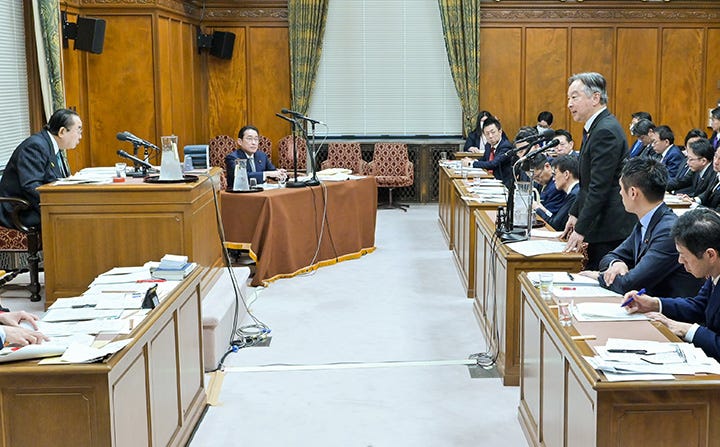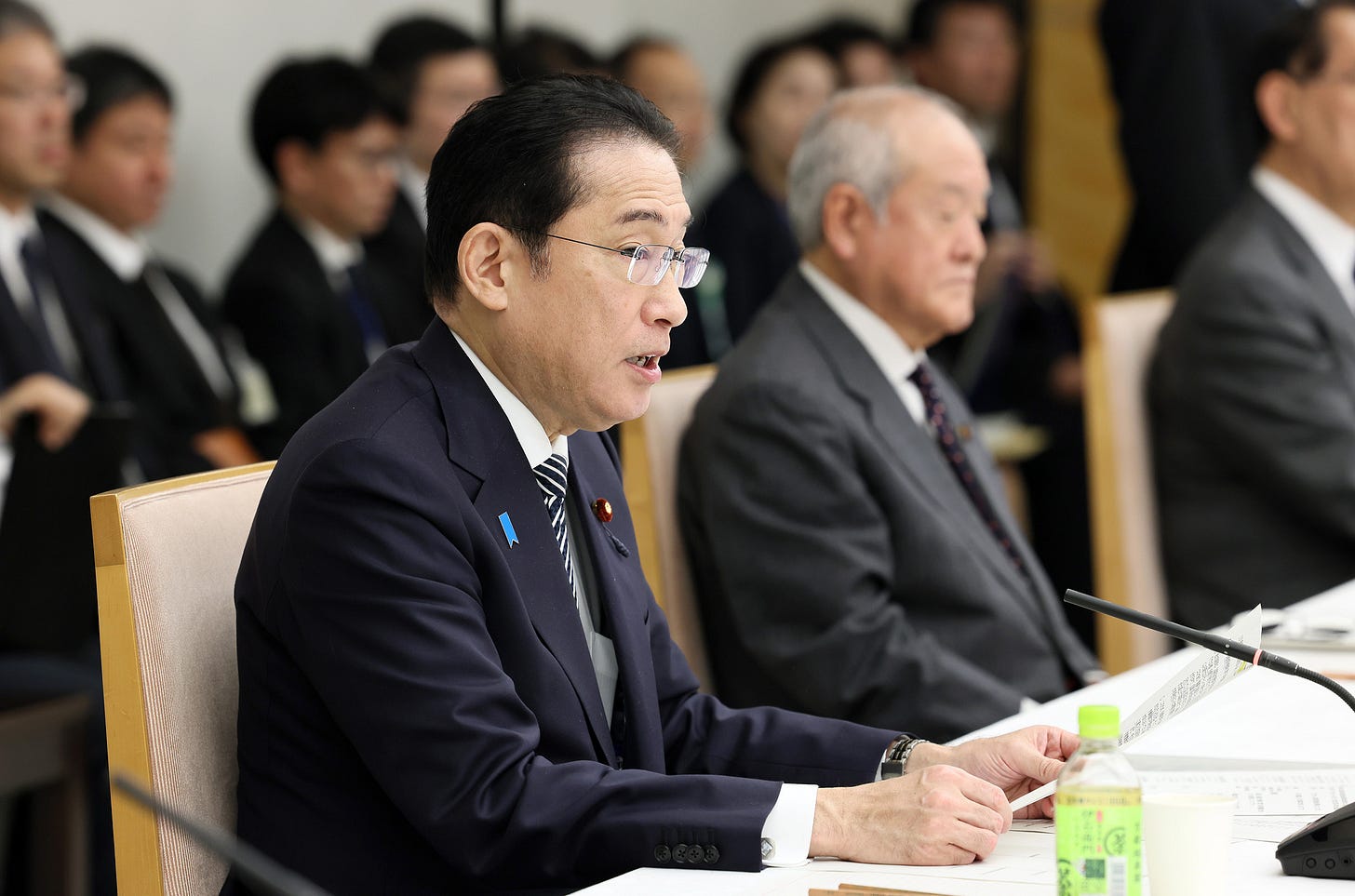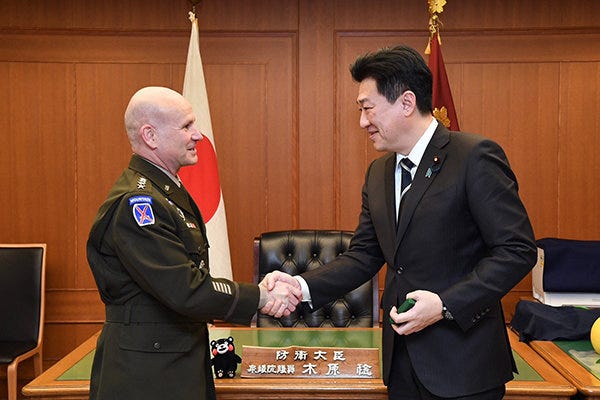Week in review, 2 March 2024
The budget passes but the scandal remains, macroeconomic policy tea leaves, and more
This is a new feature for Observing Japan, in which I provide a weekly roundup of both major developments in Japan’s politics and policymaking and important stories that might have been overlooked. Let me know in the comments (a) if this is a useful feature and (b) if there is anything else I should include here.
Politics
With the House of Representatives’ Deliberative Council on Political Ethics having held its hearings on the Liberal Democratic Party’s (LDP) kickback scandal on 29 February and 1 March, the House of Representatives had an unusual Saturday meeting on 2 March to approve the FY2024 general budget, which, at JPY 112.57tn is the second-largest budget ever. Opposition parties were reluctant to support a vote without more deliberation – and pressed for additional parliamentary scrutiny of the LDP’s financial scandal – but the Kishida government prevailed, ensuring that the budget will clear the Diet before the start of the new fiscal year on 1 April, whether or not the House of Councillors approves it.
The ethics council hearings by no means mark the end of the scandal. The House of Councillors’ own ethics council is preparing for its own hearings later this month; Kōmeitō leader Yamaguchi Natsuo is dissatisfied with how the leaders of the Abe faction have accounted for their group’s practices; and Kishida says that punishments for the scandal will be doled out at the “appropriate time.” There is little sense from the hearings that critical scrutiny of the scandal will abate in the weeks leading up to the by-elections that will be held on 28 April, which are emerging as a yet another crucial test for the prime minister (see below).
Meanwhile, the opposition Democratic Party for the People (DPFP), which has long flirted with the possibility of a formal coalition with the LDP, may be pivoting away from the ruling party thanks to the kickback scandal, though that does not necessarily mean that the DPFP is prepared to coordinate with the Constitutional Democratic Party (CDP) or Ishin no Kai.
Former Prime Minister Suga Yoshihide, who has been less involved in the shakeup in the LDP than he might otherwise have been due to ill health, dined with Koizumi Shinjirō, his former chief cabinet secretary Katō Katsunobu, Abe faction boss Hagiuda Kōichi, and Nikai faction boss Takeda Ryōta on Friday. Suga has been connected with reform-minded LDP lawmakers – many, it seems, from Kanagawa like himself – and could have a part to play in the post-Kishida landscape if his health improves.
In a speech in Tokyo this week, LDP lawmaker Funada Hajime suggested if the LDP loses all three by-elections on 28 April, it will launch a movement to unseat Kishida as party leader.
Economics
In a press conference on 29 February, Bank of Japan (BOJ) Governor Ueda Kazuo refused to confirm that the bank had met its 2% inflation target and said that work was ongoing to assess the progress towards a virtuous cycle of rising wages and prices. He acknowledged that the outcome of wage negotiations between large employers and labor unions, which will conclude this month, will be an important data point for the bank’s assessment. Nevertheless, signs continue to point to a relative tightening of Japan’s monetary policy as it is expected to drop its negative interest rate policy at either its 18-19 March policy board meeting or in April.
The general budget includes a tax reduction of JPY 40,000 per individual that will kick in on 1 June, which among other things Kishida hopes will give a boost to his political fortunes.
With the government’s reporting that births fell by 5.1% in 2023 – the eighth straight year that births have declined – the prime minister has ordered his government to prioritize a three-year package for tackling Japan’s aging, declining population.
A dovish LDP fiscal policy study group headed by Nishida Shōji, the party’s leading proponent of modern monetary theory, resumed discussions this week, calling for the government to drop the primary fiscal balance as a key policy metric. The group’s ranks including a number of former Abe acolytes, including Hagiuda, Nishimura Yasutoshi, and Sekō Hiroshige, and will undoubtedly step up its attacks on fiscal hawks in the LDP and finance ministry.
Foreign and security policy
Kishida has shelved a trip to South Korea expected for late March, possibly out of consideration for South Korea’s National Assembly elections on 10 April.
The LDP and Kōmeitō missed their February target to reach an agreement on revising Japan’s arms export rules to permit joint development of technology with third countries – including the next-generation fighter that Japan has agreed to develop with Italy and the United Kingdom – and have agreed to continue discussions in March. Both sides have acknowledged that they have narrowed the gap, but Kōmeitō’s concerns about how the public (i.e. the party’s supporters) will judge the policy have stymied progress. Arguably this is the foremost policy consequence of the fraying ties between the coalition partners, and Kōmeitō’s dissatisfaction with its coalition partner’s campaign finance problems.
General Christopher Cavoli, US Supreme Allied Commander Europe and head of NATO’s Allied Command Operations, visited Tokyo this week, where he met with Defense Minister Kihara Minoru and reaffirmed the importance of last year’s Individually Tailored Partnership Program (ITPP) between Japan and NATO. It was the first visit by NATO’s military commander to the Ministry of Defense, highlighting the steady progress in deepening ties between Japan and NATO.
Kanasugi Kenji, Japan’s ambassador to China, met with LDP lawmakers while back in Tokyo, to whom he conveyed the message that the Chinese government noticed that while 120 Japanese lawmakers visited Taiwan in 2023, the number of legislative visitors to China was in the single digits. Reportedly the response from some of the lawmakers in the room was that if they go, they might be arrested and not allowed to return. Whether these fears are realistic, they highlight the decay of the “pipes” connecting Tokyo and Beijing.
Update on subscriptions
I have been incredibly heartened by the initial response to my shift to subscriptions. I am truly grateful for your support.
If you have not subscribed yet, I hope that you will consider doing so. I will be writing a lot more going forward – I will have a longer life update soon – and you won’t want to miss it. I will be keeping all posts open to all subscribers through March 31, after which I will start publishing some posts for subscribers only.
And as an added incentive to subscribe: I will keep subscription prices at $5/month or $50/year through March 31, after which I will be raising them.
Thank you all for your support. I am excited to begin a new era for this newsletter. Stay tuned for more information to come.







I think it's a great feature, thanks for starting it
Wow, this is comprehensive, “bigly” time. Puts the Japan Times to shame ;-) Now what else do we need here. Celebrity news? Best new restaurants? Shohei updates? Just kidding. Wouldn’t want to add to your workload. On a serious note, you could add some stories regarding breaking social events of national consequence, e.g., the Johnny’s Office sexual abuse scandal or the repercussions of the Noto earthquake. But this is great, as soloblast said.